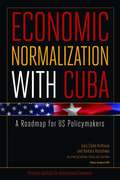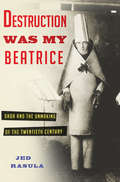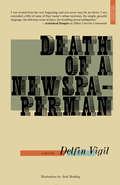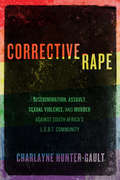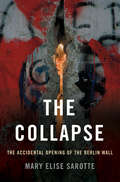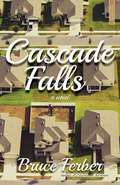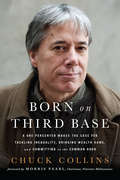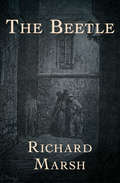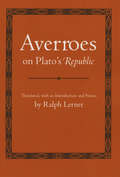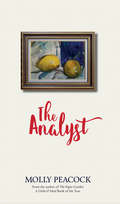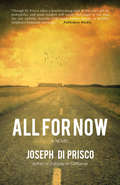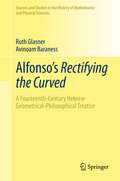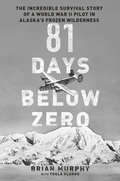- Table View
- List View
Economic Normalization With Cuba: A Roadmap For Us Policymakers
by Gary Clyde Hufbauer Barbara KotschwarGary Clyde Hufbauer, Reginald Jones Senior Fellow at the Peterson Institute for International Economics since 1992, was the Maurice Creenberg Chair and Director of Studies at the Council on Foreign Relations [1996-98), the Marcus Wallenberg Professor of International Finance Diplomacy at Georgetown University (1985-92), senior fellow at the Institute (1981-85), deputy director of the International Law Institute at Georgetown University 0979-81), deputy assistant secretary for international trade and investment policy of the US Treasury (1977-79), and director of the international tax staff at the Treasury (1974-76). Among his numerous coauthored books are Local Content Requirements: A Global Problem (2013), The United States Should Establish Permanent Normal Trade Relations with Russia (2012), Figuring Out the Doha Round [2010], and Economic Sanctions Reconsidered, 3rd edition (2007). Book jacket.
Divine Style: Walt Whitman and the King James Bible
by F. W. Dobbs-AllsoppIn exploring the seminal works of Walt Whitman, the great American poet, many commentators have acknowledged the underlying influence of The King James Bible. However, a study has yet to elucidate the precise manner in which the Bible has shaped Whitman’s poetic style. This is the deficit that F. W. Dobbs-Allsopp seeks to address in his new piece of literary scholarship: 'Divine Style: Walt Whitman and the King James Bible'. Dobbs-Allsopp, Professor of Old Testament at Princeton Theological Seminary, explicitly approaches Whitman from the perspective of a biblical scholar. Utilising his wealth of expertise in this field, he constructs a compelling, erudite and methodical argument for the King James Bible’s importance in the evolution of Whitman’s style – from his signature long lines to the prevalence of parallelism and tendency towards parataxis in his works. 'Divine Style' focuses on Whitman’s output in the years preceding the release of his 1855 opus 'Leaves of Grass' through the general period of the book’s first three editions. In this, Dobbs-Allsopp’s exploration of the period is exhaustive – covering not just Leaves of Grass but recently recovered notebooks, newly digitised manuscripts and additions to the corpus, such as the novel 'Life and Adventures of Jack Engle'. This is a work of careful, detailed scholarship, offering an authoritative commentary that will be a valuable resource for students of Whitman, biblical scholars and scholars of literature more generally.
Destruction Was My Beatrice: Dada and the Unmaking of the Twentieth Century
by Jed RasulaIn 1916, as World War I raged around them, a group of bohemians gathered at a small nightclub in Zurich, Switzerland for a series of bizarre performances. Three readers simultaneously recited a poem in three languages; a monocle-wearing teenager performed a spell from New Zealand; another young man flung bits of papier-mâché into the air and glued them into place where they landed. One of these artists called the sessions "both buffoonery and a requiem mass. ” Soon they would be known by a more evocative name: Dada. In Destruction Was My Beatrice, modernist scholar Jed Rasula presents the first narrative history of the emergence, decline, and legacy of Dada, showing how this strange artistic phenomenon spread across Europe and then the world in the wake of the Great War, fundamentally reshaping modern culture in ways we’re still struggling to understand today.
Death of a Newspaperman
by Delfin VigilTheir lives were centuries apart. Their spirit was one and the same. Desmond De Leon grows up in the outskirts of 1980s San Francisco, avoiding gangs, dodging bullets and caring nothing about the petty politics of his troubled part of town. He’s far too fascinated with the bloodier and bolder history of San Francisco newspaper journalism based downtown. Once the epicenter of American journalism, it’s where the infamous newspaper tycoon Charles Sansome died with pistol in hand during an era when editorial disputes were resolved within 20 paces. As the headstrong, scrappy kid rises from San Francisco Call copy boy to reporter, he documents the deteriorating character and morals of his journalist mentors, along with the decline of the newspaper itself. Walking the same ghostly streets as his 19th-century newspaper tycoon heroes once did, and with a dash of supernatural guidance, Desi’s search to find out what Call founder Charles Sansome would do leads him from the highest avenues of society and politics to the back alleys of the Mission District in this hip, funny, romantic and ultimately tragic near roman à clef written by the one who lived it.
Corrective Rape
by Charlayne Hunter-GaultRape, Sexual Violence, Murder, Discrimination, Assault, LGBT, Lesbian, Gay, Bisexual, Transgender, South Africa, Africa, L.G.B.T.
The Collapse: The Accidental Opening of the Berlin Wall
by Mary Elise SarotteThe Berlin Wall was erected in 1961 to end all traffic between the city’s two halves: the democratic west and the communist east. The iconic symbol of a divided Europe, the Wall became a focus of western political pressure on East Germany; as Ronald Reagan’s famously said in a 1987 speech in Berlin, "Mr. Gorbachev, tear down this wall!” But as award-winning historian Mary Sarotte shows in [Title TK] , the opening of the Wall on November 9, 1989 was not, as is commonly believed, the East German government’s deliberate concession to outside influence. It was an accident. A carelessly worded memo written by mid-level bureaucrats, a bumbling press conference given by an inept member of the East German Politburo, the negligence of government leaders, the bravery of ordinary people in East and West Berlin--these combined to bring about the end of nearly forty years of oppression, fear, and enmity in divided Berlin. When the news broke, Washington and Moscow could only stand by and watch as Tom Brokaw and other journalists narrated the televised broadcast of this critical moment in the thawing of the cold war. Sarotte opens her story in the months leading up to that fateful day. Following East German dissidents, she shows how their efforts coalesced around opposition to the regime’s restrictions on foreign travel. The city of Leipzig, close to the border with Czechoslovakia, became a hothouse of activism, and protests there quickly grew into massive demonstrations. The East German Politburo hoped to limit its citizens’ knowledge of these marches, but two daring dissidents, East Berliners Aram Radomski and Siegbert Schefke, managed to evade the Stasi and film the largest of them from a church tower. They then smuggled their tape to West Germany; broadcast in both nations, the footage galvanized activists across East Germany, and precipitated the stunning developments on November 9. Facing mounting pressure from its own citizens, the East German Politburo planned to put off enacting any meaningful change to its travel policy by issuing a deceptive ruling that would appear to offer more freedom, but which in fact would allow the state to maintain strict control over its citizen’s movements. But the bureaucrats tasked with preparing the "new” regulations misunderstood their task, and instead drafted a declaration that said East Germans could freely leave the country. This declaration ended up in the hands of regime spokesman Günter Schabowski, who announced the rules at a press conference without understanding their import. Stunned reporters were soon broadcasting the news around the world. Crowds of East Germans began streaming to the Wall, prompting a showdown with border guards, who received no support or direction from East German leadership as the throngs multiplied. By 11:30, Harald Jäger, a second-tier passport control officer, had had enough and finally opened the wall to the mob gathering outside his gate. Even though East German forces successfully regained control by the morning, it was too late--for the wall, for the regime, and for Communism in Eastern Europe. Drawing on evidence from archives in multiple countries and languages, along with dozens of interviews with key actors, including Harald Jäger, [Title TK] is the definitive account of the event that brought down the East German Politburo and came to represent the final collapse of the Cold War order.
Cascade Falls
by Bruce FerberCascade Falls explores the failed promise of the American Dream. Raised to believe that with hard work, anything is possible, a staggering number of Americans hate their jobs and see little chance of ever escaping the grind. In his tragicomic followup to the laugh-ridden Elevating Overman, Bruce Ferber asks the question: "How does giving up our dreams affect our relationships and our psyches?" Danny Johnson, a writer whose career never materialized, moves with his wife and children to Cascade Falls, a water-filled, golf community in the bone-dry desert outside of Phoenix. Grudgingly going to work for his father Ted, the Elmer Gantry of home development, Danny's quest for stability ultimately comes up short. His marriage begins to fray and the housing market goes bust, forcing him and those around him to examine their lives anew. Cascade Falls exposes the desperate price paid for sacrificing who we are for how and where we live.
Born on Third Base: A One Percenter Makes the Case for Tackling Inequality, Bringing Wealth Home, and Committing to the Common
by Chuck CollinsAs inequality grabs headlines, steals the show in presidential debates, and drives deep divides between the haves and have nots in America, class war brews. On one side, the wealthy wield power and advantage, wittingly or not, to keep the system operating in their favor—all while retreating into enclaves that separate them further and further from the poor and working class. On the other side, those who find it increasingly difficult to keep up or get ahead lash out—waging a rhetorical war against the rich and letting anger and resentment, however justifiable, keep us from seeing new potential solutions. But can we suspend both class wars long enough to consider a new way forward? Is it really good for anyone that most of society’s wealth is pooling at the very top of the wealth ladder? Does anyone, including the one percent, really want to live in a society plagued by economic apartheid? It is time to think differently, says longtime inequality expert and activist Chuck Collins. Born into the one percent, Collins gave away his inheritance at 26 and spent the next three decades mobilizing against inequality. He uses his perspective from both sides of the divide to deliver a new narrative. Collins calls for a ceasefire and invites the wealthy to come back home, investing themselves and their wealth in struggling communities. And he asks the non-wealthy to build alliances with the one percent and others at the top of the wealth ladder. Stories told along the way explore the roots of advantage, show how taxpayers subsidize the wealthy, and reveal how charity, used incorrectly, can actually reinforce extreme inequality. Readers meet pioneers who are crossing the divide to work together in new ways, including residents in the author’s own Boston-area neighborhood who have launched some of the most interesting community transition efforts in the nation. In the end, Collins’s national and local solutions not only challenge inequality but also respond to climate change and offer an unexpected, fresh take on one of our most intransigent problems.
The Beetle: Large Print (The\penguin English Library)
by Richard Marsh'No room!-Full up!'He banged the door in my face. That was the final blow. To have tramped about all day looking for work; to have begged even for a job which would give me money enough to buy a little food; and to have tramped and to have begged in vain,-that was bad. But, sick at heart, depressed in mind and in body, exhausted by hunger and fatigue, to have been compelled to pocket any little pride I might have left, and solicit, as the penniless, homeless tramp which indeed I was, a night's lodging in the casual ward,- and to solicit it in vain!-that was worse. Much worse. About as bad as bad could be. I stared, stupidly, at the door which had just been banged in my face. I could scarcely believe that the thing was possible. I had hardly expected to figure as a tramp; but, supposing it conceivable that I could become a tramp, that I should be refused admission to that abode of all ignominy, the tramp's ward, was to have attained a depth of misery of which never even in nightmares I had dreamed. As I stood wondering what I should do, a man slouched towards me out of the shadow of the wall. 'Won't 'e let yer in?''He says it's full. ''Says it's full, does 'e? That's the lay at Fulham,-they always says it's full. They wants to keep the number down. 'I looked at the man askance. His head hung forward; his hands were in his trouser pockets; his clothes were rags; his tone was husky.
Averroes on Plato's "Republic"
by Averroes Ralph Lerner"In one fashion or another, the question with which this introduction begins is a question for every serious reader of Plato's Republic: Of what use is this philosophy to me? Averroes clearly finds that the Republic speaks to his own time and to his own situation. . . . Perhaps the greatest use he makes of the Republic is to understand better the shari'a itself. . . . It is fair to say that in deciding to paraphrase the Republic, Averroes is asserting that his world--the world defined and governed by the Koran--can profit from Plato's instruction."--from Ralph Lerner's IntroductionAn indispensable primary source in medieval political philosophy is presented here in a fully annotated translation of the celebrated discussion of the Republic by the twelfth-century Andalusian Muslim philosopher, Abu'l-Walid Muhammad Ibn Ahmad Ibn Rushd, also know by his his Latinized name, Averroes. This work played a major role in both the transmission and the adaptation of the Platonic tradition in the West. In a closely argued critical introduction, Ralph Lerner addresses several of the most important problems raised by the work.
The Analyst
by Molly PeacockWhen a psychoanalyst became a painter after surviving a stroke, her longtime patient, distinguished and beloved poet Molly Peacock, took up a unique task. The Analyst is a new, visceral, twenty-first century "in memoriam" of ambiguous loss in which Peacock brilliantly tells the story of a decades-long patient-therapist relationship that now reverses and continues to evolve. Peacock invigorates the notion of poetry as word-painting: A tapestry of images, from a red enameled steamer on a black stove to Tibetan monks funneling glowing sand into a painting, create the backdrop for her quest to define identity. From "In Our Unexpected Future":. . . for frocks outlast pillars. But feelingsoutlive frocks. The immaterial storms through,a force beyond years (a mere four since youwere nearly felled). It isn't what happened that lasts. Not art, either, but the savory core. What's felt.
All For Now
by Joseph Di PriscoBrother Stephen dies suddenly. That’s when things get complicated. Is Stephen’s death his wake-up call? This possibility slowly dawns on him. Soon, though, he is behind the wheel of a Prius, driving through his afterlife, listening to himself being interviewed on NPR. "It’s just like high school, Terry. You know, maybe it is high school,” he tells her, in the interview, as she questions him about lawsuits filed by students who claimed to have been molested by pedophile Brothers. As an administrator of his Roman Catholic religious order, he was caught in the middle of these heartbreaking cases. In fact, the lawsuit he was dealing with the moment he died is one that strikes especially close to his heart. He once knew the plaintiff--he once knew her very well--but he also knew the Brother who is named in the lawsuit. Now that he’s dead, he’s more determined than ever to get to the truth. He spends his afterlife unraveling this terrible mystery, learning more about the plight of the survivor and that of the accused, but the biggest mystery he faces is one about himself.
Alfonso's Rectifying the Curved: A Fourteenth-Century Hebrew Geometrical-Philosophical Treatise (Sources and Studies in the History of Mathematics and Physical Sciences)
by Ruth Glasner Avinoam BaranessThis volume offers a new English translation, introduction, and detailed commentary on Sefer Meyasher 'Aqov, (The Rectifying of the Curved), a 14th-century Hebrew treatise on the foundation of geometry. The book is a mixture of two genres: philosophical discussion and formal, Euclidean-type geometrical writing. A central issue is the use of motion and superposition in geometry, which is analyzed in depth through dialog with earlier Arab mathematicians. The author, Alfonso, was identified by Gita Gluskina (the editor of the 1983 Russian edition) as Alfonso of Valladolid, the converted Jew Abner of Burgos. Alfonso lived in Castile, rather far from the leading cultural centers of his time, but nonetheless at the crossroad of three cultures. He was raised in the Jewish tradition and like many Sephardic Jewish intellectuals was versed in Greek-Arabic philosophy and science. He also had connections with some Christian nobles and towards the end of his life converted to Christianity. Driven by his ambition to solve the problem of the quadrature of the circle, as well as other open geometrical problems, Alfonso acquired surprisingly wide knowledge and became familiar with several episodes in Greek and Arabic geometry that historians usually consider not to have been known in the West in the fourteenth century. Sefer Meyasher 'Aqov reflects his wide and deep erudition in mathematics and philosophy, and provides new evidence on cultural transmission around the Mediterranean.
81 Days Below Zero: The Incredible Survival Story of a World War II Pilot in Alaska's Frozen Wilderness
by Brian MurphyShortly before Christmas in 1943, five Army aviators left Alaska’s Ladd Field on a test flight. Only one ever returned: Leon Crane, a city kid from Philadelphia with little more than a parachute on his back when he bailed from his B-24 Liberator before it crashed into the Arctic. Alone in subzero temperatures, Crane managed to stay alive in the dead of the Yukon winter for nearly twelve weeks and, amazingly, walked out of the ordeal intact. 81 Days Below Zero recounts, for the first time, the full story of Crane’s remarkable saga. In a drama of staggering resolve with moments of phenomenal luck, Crane learned to survive in the Yukon’s unforgiving landscape. His is a tale of the human capacity to endure extreme conditions and intense lonelinessand emerge stronger than before.
القانون في الطب 2
by ابن سينااعلم أن المرارة كيس معلّق من الكبد إلى ناحية المعدة من طبقة واحدة عصبانية ولها ضمّ إلى الكبد ومجرى فيه يجذب الخلط الرقيق الموافق لها والمرار الأصفر ويتصل هذا المجرى بنفس الكبد والعروق التي فيها يتكون الدم وله هناك شعب كثيرة غائصة وإن كان مدخل عمودها من التقعير والفم ومجرى إلى ناحية المعدة. والأمعاء ترسل فيه إلى ناحيتهما فضل الصفراء على ما ذكرناه في الكتاب الأول. وهذا المجرى يتصل أكثر شعبه بالاثني عشري وربما اتصل شيء صغير منه بأسفل المعدة وربما وقع الأمر بالضد فصار الأكبر المتصل بالوعاء الأغلظ إلى أسفل المعدة والأصغر إلى الاثني عشري. وفي أكثر الناس هو مجرى واحد متصل بالاثني عشري. وأما مدخل الأنبوبة المصاصة للمرارة في المرارة فقريب من مدخل أنبوبة المثانة في المثانة. ومن عادة الأطباء الأقدمين أن يسموا المرار الكيس الأصغر كما أنه من عادتهم أن يسموا المثانة الكيس الأكبر ومن المنافع في خلقة المرارة تنقية الكبد من الفضل الرغوي وأيضاً تسخينها كالوقود تحت القدر وأيضاً تلطيف الدم وتحليل الفضول وأيضاً تحريك البراز وتنظيف الأمعاء وشدّ ما يسترخي من العضل حوله وإنما لم يخلق في الأكثر للمرارة سبيل إلى المعدة لتغسل رطوباتها بالمرة كما تغسل بها في رطوبات الأمعاء لأن المعدة تتأذى بذلك وتغثّي ويفسد الهضم فيها بما يخالط الغذاء من خلط رديء ويأتيها من العرق الضارب. وللعصبة التي تتصل بالكبد شعبتان صغيرتان جداً والمرارة كالمثانة طبقة واحدة مؤلفة من أصناف الليف الثلاثة وإذا لم تجذب المرارة المرار أو جذبت فلم تستنق عنه حدثت آفات فإن الصفراء إذا احتبست فوق المرارة أو رمت الكبد وأورثت اليرقان وربما عفنت وأحدثت حميات رديئة. وإذا سالت إلى أعضاء البول بإفراط قرحت وإذا سالت إلى عضو ما أحدثت الحمرة والنملة وإذا دبت في البدن كله ساكنة غير هائجة أحدثت اليرقان وإذا سالت عن المرارة إلى الأمعاء بإفراط أورثت الإسهال المراري والسحج.
التنظيم القانوني للدراجات المائية 16 ابريل 2017
by Dubai Police Academyالتنظيم القانوني لاستعمال الدراجات البخارية المائية (Jet-ski)
التعويض عن الضرر النفسي- للتحكيم 8 5 2016
by Dubai Police Academyجاءت اتفاقيات النقل الجوي الدولية بشكل أساسي، لتنظيم وحماية مرفق النقل الجوي، فتضمنت الاتفاقيات بشكل صريح وواضح حالات مسؤولية الناقل، ومقدار التعويضات، ليكون الناقل في مأمَن من الخضوع للقوانين والأنظمة الداخلية للدول. كما أنها في المقابل تسعى إلى تحقيق حماية للراكب، وخاصة في ما يتعلق ببطلان أي شرط يُعفي الناقل من المسؤولية.
سيرة الأميرة ذات الهمة وولدها عبدالوهاب - جزء1
by ليس موجودقال الراوي: ومن جملة من خرج إليه عمرو بن عبد الله وهو يقول ادع لنا يا أخينا في الله، وأما أبا محمد البطال لما رأى الناس يهرعون سأل عن ذلك، فقال له بعض الإخوان فاز بالسعادة من فاز هذا القاضي قد قدم من أرض الحجاز فسار أبي محمد البطال من جملة الناس إلى أن وصل إليه، فرآهم يقبلون قدميه والشاطر من يصل إليه، وهو يبكي فما زال البطال يضحك إلى أن قرب منه، ووقعت عينه عليه فقال عقبة يا ولد يا بطال العاقبة إليك نزور البيت العتيق، وتزول عنك الذنوب، ويصل إليك التوفيق وتعاين ذاك المكان تحقيق، فقال البطال والله يا قاضي ما أنا إلا زرت البيت الذي كنت فيه، لكن ما غطست في جرن البركة الذي أنت غطست فيه، فقال عقبة وقد عدم رشاده وخفق من ذلك فؤاده، ويلك يا بطال إيش هذا الكلام وهذا الفضول الذي تقوله، وإذا بالأمير عمرو بن عبد الله قد وصل، فقال يا ولدي يا عمرو والله يوصل إليك ما دعوت لك في صحيفتك من الدعاء في البيت الحرام وزمزم والمقام، ثم ركب على ظهر بغلته بعد السلام والناس من وراه منقلبة، وكان البطال لما وقع بالقنديل قدمه للأمير عبد الوهاب، ففرح به فرحًا شديدًا ما عليه من مزيد، وكان البطال كره المقام بين بني سليم، وقال وحق المصطفى لا أقمت في مكان فيه عقبة بعد أن رأيت بعيني ما فعله، ولا بد أن أكون لهلاكه سبب، وأنحره كما أنحر الغنم، ثم طلع إلى قلعة الكوكب وأطلع الأميرة على القنديل، وقال هذا الذي تأسفتي عليه، وطلبتيه من الملك العلام، بأن يكون معلق في البيت الحرام، ثم حدثهم بحديث عقبة وما جرى له فقالت الأميرة لا حول ولا قوة إلا بالله العلي العظيم، وصعب على الأمير عبد الوهاب وقال للبطال على ماذا عولت أن تفعل، فقال انتقل من عندكم وأجعل معولي على الله، ثم عليكم وأنحر هذا اللعين فإني سمعته يوعد كلب الروم بهلاكك ويجعل بلاد الإسلام للروم والكفرة اللئام، ويملك البيت الحرام فقال عبد الوهاب ساءت ظنونه وأعماله وقطعت أوصاله ولا بد لي إن شاء الله أن أصلبه على باب الذهب الذي تنصر فيه، ولو احتمى بكل من كفر، وما قدر هذا الكلب إلا كلب حتى يذكر بيت الله الحرام، وزمزم والمقام، وأنت أخي من الدنيا والآخرة، لك ما لي وعليك ما عليَّ، ثم إنه أمر غلمانه أنهم ينقلون أسباب البطال من ملطية إلى قلعة الكوكب، وكانت ثلاثة جوار روميات وعشرة غلمان والكل علمهم الاحتيال والخداع، وجرأهم على الأهوال وأقام البطال في قلعة الكوكب وأعلم الأمراء بإسلام مارس ودارس، وأختهم أرمانوسة، ففرحوا بذلك فرحًا شديدًا ما عليه من مزيد، وقالت الأميرة سبحان الله من أيقظ هؤلاء من سنة الغفلة وأضل عقبة من علمه وفضله، ولكن الله يفعل ما يشاء ويحكم ما يريد، ولم يزل البطال في قلعة الكوكب إلى أن سمع بوصول عقبة، فقال لا بد لي من الخروج إليه، ثم إنه خرج كما ذكرنا وكلم عقبة بما وصفناه، وعاد البطال إلى قلعة الكوكب وأعلم الأمير بقدوم عقبة، وكيف وصل من الحجاز، فقالت الأميرة إن قتله عند الله أعظم أجر من فتح القسطنطينية، لأنه يلعب بالأديان ويكفر بالرحمن، ثم أقاموا إلى أن أصبح بالصباح، وإذا برسول الأمير عمرو وصل إليهم يطلب الأمير أبو محمد البطال، وأيضًا يطلب القنديل ويأخذ من البطال حق القصاص بما يتكلم في حق عقبة ويقابله بما يستحقه، وأما القنديل يوصله إلى الأمام فإنه ولي الأحكام. قال الراوي: وكان السبب في ذلك الملعون عقبة لأنه لما وصل إلى ملطية وعلم أن البطال شنع عليه بهذه الأقوال الرديئة، وأيضًا بالغ في تشديد هذه القضية، وأنه اطلع على تنصره فقال أنا اعلم أن هذا الصبي يكشف سري بما رأى مني، فلم ينم تلك الليلة حتى ملأ قلب عمرو بن عبد الله، وقال له يا ولدي أنت هاهنا ملك العربان وأمير الثغور في كل مكان، وما نريد يتم أمر إلا ونعلم به الخليفة أمير المؤمنين، وإلا إن دمت هكذا انتقصت منزلتك عند الأمراء وعند الخاص والعام، وأيضًا تستطيل بني عامر وبني كلاب على بني سليم، وما ينبغي أن تكون بني سليم تحت الذل والضيع، وينبغي أنك ترسل تطلب القنديل لأن البطال دخل إلى القسطنطينية وسرق مالاً جزيلاً، ومن جملته ذلك القنديل وهو من الصواب إنك تطلبه وتطلب أيضًا البطال حتى أنه يقوم إليَّ ذليل، وأقبح بما قال في حقي لأنه رماني بالزور والبهتان، وتكلم في حقي بالكفر والطغيان، وسوف يكون لهلاكه سبب، وإذا لم نقيم ناموس الإمارة وإلا حلت بنا كل الخسارة.
الموازنة بين حق الأجنبي في الخصوصية وحق الدولة في حماية أمنها وتطبيقاتها في القضاء الأوروبي والقضاء الأمريكي-بعد التعديل
by Dubai Police Academyهناك اعتراف لا لبس فيه على الصعيدين الدولي والداخلي بالحق في الخصوصية باعتباره حقا أساسيا من حقوق الإنسان, كما أن حق الدولة في حماية أمنها من عبث العابثين أمر لا جدال فيه. وفي هذه الدراسة نتناول المعايير الدولية للحق في الخصوصية, والقدر الذي يسمح به القانون للتدخل في خصوصيات الأجنبي من اجل المصالح المشروعة الأخرى. وقد أكدنا فيه على اتجاه القضاء في كل من أوروبا والولايات المتحدة الأمريكية, لان التشدد في التفتيش والمضايقات التي تحدث للأجانب في المعابر الحدودية وبعد دخول البلاد تكثر فيهما, فضلا عن السوابق القضائية الكثيرة في هذا الشأن
حكم اشتراط المرأة عدم الزواج عليها دراسة مقارنة بين الفقه الإسلامي وبعض قوانين الاحوال الشخصية العربية
by Dubai Police Academyالحمد لله رب العالمين أمر بالوفاء بالعهود فقال: وَأَوْفُوا بِعَهْدِ اللَّهِ إِذَا عَاهَدْتُمْ وَلا تَنْقُضُوا الأَيْمَانَ بَعْدَ تَوْكِيدِهَا وَقَدْ جَعَلْتُمُ اللَّهَ عَلَيْكُمْ كَفِيلا إِنَّ اللَّهَ يَعْلَمُ مَا تَفْعَلُونَ( ) والصلاة والسلام على رسول الله القائل: «أَحَقُّ الشُّرُوطِ أَنْ تُوفُوا بِهِ مَا اسْتَحْلَلْتُمْ بِهِ الفُرُوجَ»( ) ورضي الله عن آله الأطهار، وصحابته الأخيار، ومن تبعهم بإحسان ما تعاقب الليل والنهار.
خصوصية الفرد في الفقه الإسلامي وموقف التشريعات القانونية في دولة الإمارات العربية المتحدة منها معدّل
by Dubai Police Academyيهدف البحث المعنون بـ " خصوصية الفرد في الفقه الإسلامي وموقف التشريعات القانونية في دولة الإمارات العربية المتحدة منها" إلى بيان أحكام الفقه الإسلامي في تأكيد حق الفرد في حياته الخاصة، وحماية الخصوصية من أي اعتداء، حيث تناول الفقهاء المسلمون هذا الحق في كثير من التطبيقات وذكروا المسائل الكثيرة التي تتعلق بحماية هذا الحق، والاستثناءات التي يجوز فيها انتهاك هذه الخصوصية في حالات ضيقة
